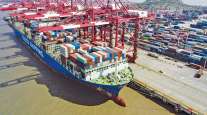Truck Makers Post Higher Earnings
This story appears in the Feb. 10 print edition of Transport Topics.
Truck manufacturers ended 2013 on a high note, with Paccar Inc. posting higher fourth-quarter profit, and Daimler AG and Volvo AB reporting improved results in their truck divisions.
Bellevue, Wash.-based Paccar said its net income grew to $334.2 million, up 32% from the same quarter the previous year.
Daimler Trucks North America’s sales of U.S. trucks rose 8% in the quarter to 30,467, part of a worldwide rise of 19% in unit sales to 134,550.
Stuttgart, Germany-based Daimler said its global truck division’s earnings before interest and taxes jumped 92% to 565 million euros ($769 million).
Sweden’s Volvo AB, parent of Volvo Trucks and Mack Trucks, said deliveries in the North American market rose 22% to 12,773.
On a worldwide basis, Volvo’s operating income at its trucks segment climbed 58% to 2.97 billion kronor ($456.3 million), excluding restructuring charges.
Executives at the three companies indicated that 2014 should show more improvement.
Paccar CEO Mark Pigott said fleet customers in North America “are doing well,” referring to recent strength in truck orders and overall economic growth.
“I think they’re optimistic,” Pigott said on the company’s Jan. 31 earnings call. “They have been through some tough times, but over the last year or two or three, things are improving. You’re starting to see some pretty good results from a wide range of industries, and most of them have some sort of trucking impact.”
“Demand in North America is on a good level, and following a weak start to 2013, we gradually recovered our market shares and ended the year at a higher level than 2012,” Volvo CEO Olof Persson said Feb. 6. “An increasing number of customers in North America
are choosing the group’s engines and transmissions for their trucks, which gradually will translate into a bigger aftermarket business.”
Daimler sells the Freightliner and Western Star brands in North America, as well as the Detroit brand of diesel engines, transmissions and axles.
“After the world market for medium- and heavy-duty trucks expanded perceptibly in 2013 despite difficult market conditions, further moderate growth in global demand is expected this year,” Daimler said in its Feb. 6 report.
In North America, Daimler said it anticipates “significant” market growth of up to 10% due to “the increasingly dynamic economy.”
In December, Navistar International Corp. reported narrower losses for its fiscal fourth quarter, ended Oct. 31. The truck and engine maker lost $154 million, compared with a loss of $2.77 billion a year earlier.
Paccar, which sells Kenworth and Peterbilt trucks in North America, said its quarterly revenue was $4.6 billion, up from $3.99 billion in the 2012 quarter.
Quarterly revenue worldwide at Daimler Trucks grew 9% to 8.5 billion euros, and U.S. orders in the fourth quarter increased 18% to 37,521.
Volvo said global sales at its truck unit climbed 11% to 52 billion kronor.
North American orders also were strong at Volvo, including an 80% rise to 10,972 for the Volvo nameplate and 47% for Mack to 5,687 units.
Paccar said it sold 212,000 Class 8 trucks in the United States and Canada in 2013, with its Kenworth and Peterbilt brands capturing 28% market share.
“Truck demand is being driven primarily by the ongoing replacement of the aging truck population and improving housing and automotive sectors,” Paccar Executive Vice President Dan Sobic said.
The company expects to sell 210,000 to 240,000 trucks in 2014, “driven by vehicle replacement and some expansion of industry fleet capacity, reflecting anticipated economic growth,” Sobic said.
The latest results also indicated improving margins, measured as a percentage of revenue. Daimler rose to 6.6% from 3.8% in the fourth quarter, and Volvo improved to 5.7% from 4.0%.
Volvo also said it plans to cut 4,400 “white-collar” employees and consultants throughout the company, including the 2,000 job cuts announced last quarter, as part of a restructuring plan. The majority of the cuts will be implemented in 2014, Volvo said.



